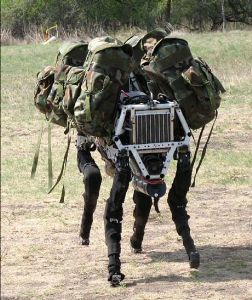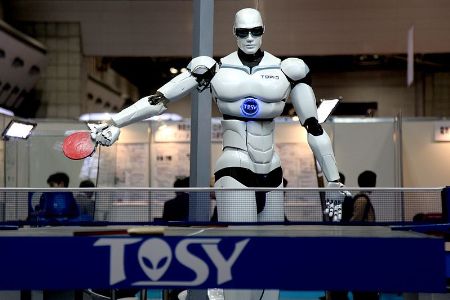by Larry
May, 2015They Are Taking Our Jobs!
The digital revolution and computerization have created millions of jobs in this country, yet they have also made many U.S. positions redundant, an ongoing set of positive and negative factors for our employment market. Thanks in part to a variety of global trade agreements, there is more commerce between the U.S. and other nations, and this too is good for our economy. Without a vital, growing economy, jobs will be much reduced. Yet with the same trade agreements comes increasing competition from workers in Latin America, Europe, Africa, and Asia for jobs that used to be primarily carried out by U.S. workers. Great changes in demographics, industries, and labor sources have thus in the past several generations had both positive and negative effects on the prospects for good employment, advancement, and security among American-born and foreign-born workers alike. Our national economic strength has remained relatively good, yet the ease with which individuals can gain and keep employment, truly get ahead, and improve circumstances for themselves and their families over time has diminished. In such an environment, many millions of Americans either remain unemployed or feel the need to stay in jobs they do not like. Some are working less hours than they would prefer, while others must work more than one job in order to look after themselves and feed and care for their dependents. Over and above that, genuinely saving and investing while on very tight budgets can rarely be achieved. Now comes word (Rise of the Robots, by Martin Ford) that computers and sophisticated robots, bots for short, will in the next several years be taking over millions more of our jobs. 18-wheelers are already operating on our highways in some states with computers at the controls. Their steering wheels still move as if turned by people, but the human "drivers" sit back and watch it happen, their hands in their laps or on their cell phones, etc. They are just available in case something unexpected happens so that manual control has to be restored. For instance, a bot cannot yet tell the difference between a crumpled cardboard box in the roadway and a baby in a blanket just ahead in one's lane. With fewer babies in the way at airports, computers are already "piloting" passenger planes better than people can. It almost goes without saying that if bots can replace upper level management they can also make redundant very nearly all the employees who currently work for them. Sure enough, current algorithm development is sufficient that robots can now do many of the functions of top managers! Ford says that within a decade they can take over virtually all white-collar jobs. Given the probable human resistance to such a transition, it could require a little longer, yet a generation from now there may well be no need in the workplace for all but a few of us.
I admit this sounds farfetched, like an implausible sci-fi story, yet just as an IBM computer called Watson a few years ago beat out all human contestants on "Jeopardy" and chess programs these days regularly beat chess masters, so too there are now "genius computers" whose sole function is to look for key scientific or mathematical relationships we have not yet discovered otherwise, ones such as Einstein found in his insight: E = MC squared (energy = mass times the speed of light squared). Reportedly, they are actually finding some, but their human colleagues do not yet know enough to understand what these new relationships mean or how they can be utilized. It is as if an alien species landed and tried to tell us stuff from their more advanced knowledge of how things work, maybe how to achieve practical everyday fusion reactions, for instance, or to use anti-gravity drives, but we lacked the concepts to permit communicating with them. Around the world, about a thousand drones have been documented as replacing surveillance and bomber pilots. Unknown numbers of drones are also being used by Russia, China, and Turkey, so the total could be substantially higher. As has ever been the case, technological advances used in warfare will soon thereafter migrate to the civilian world. Robots are also assisting customers in retail outlets, performing surgeries, aiding in patient care in other ways, exploring the bottom of the ocean, and sending back data on the other planets in our Solar System as well as on their moons, plus on asteroids, comets, and the Sun itself. Capitalism and innovation being what they are, we may assume that in another 10-20 years millions of human workers are likely to become redundant (or more redundant), replaced by bots of many kinds. What then? And who will be responsible for all these new non-human workers? Are we satisfied with their current supervision? For people, on the one hand the present structure of payment based on productivity will have to change. One cannot simply layoff 90% of the workforce and still have a healthy, growing financial system. We may need to shift to a social system in which work is not a requirement but a luxury that we volunteer for instead of getting paid. High standards of living might be established as the right of every individual, not dependent on income from traditional work. The profits from bots, however, could be taxed and divided up to assure citizens all have the basics. People need to find ways to feel and be of genuine value apart from their livelihoods. It is the same dilemma faced each year by millions of retirees, only on a much larger, global scale. There is actually precedent for something like the transition that is called for. Employment at one time could involve just about every able-bodied man, woman, and child above a certain age, and work hours often were 12 or more daily, 6 or more days at a stretch, roughly 80 hours weekly. Thanks to a wealth of efficiencies, full-time work in this country was able to be reduced at least 50% while actually significantly increasing our living standards and life expectancies. We have a choice: either we serve the bots and the enterprises that own them, while those no longer needed are discarded by society, in which case existence for most people might become much worse, or we work far less on average than is the case today and let the bots take up the slack in terms of provision for goods and services for everyone. (If we do not get it right, there might be armies of bots and disaffected people making this transition go in a much more destructive way.) On the other, once that little problem has been solved, what shall we do with all our extra free time? It is one thing to have an extra day or two off a week now and then, another to have years or decades stretching ahead of us with nothing particularly to do. All in all, we live in quite interesting times. They may be getting even more so for those lucky enough to live through them. |

